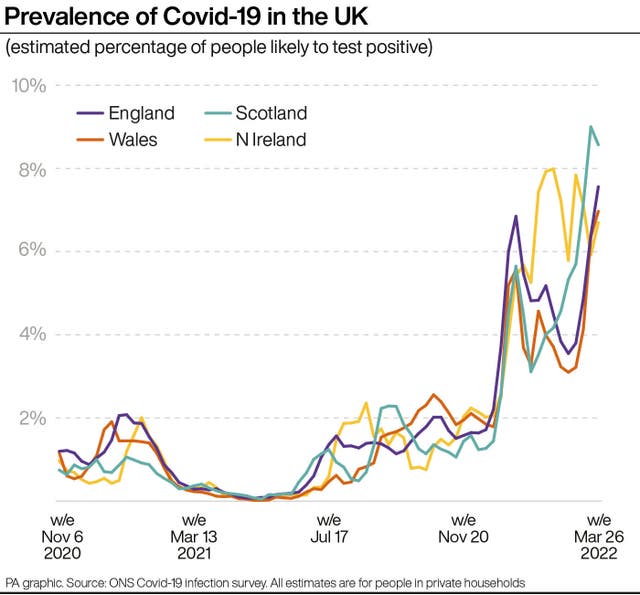Covid infections among over-35s climb to record levels in England
But prevalence of the virus remains highest among children between the age of two and school year 6.

Covid-19 infections among people aged 35 and over in England have reached record levels, with “notable increases” in the oldest groups, new figures show.
Prevalence of the virus among the over-70s has been at an all-time high for several weeks, and climbed again to 6.6%, or one in 15 people, in the seven days to March 26.
Infections among 50 to 69-year-olds have hit a record high for the second week in a row and stand at 7.2%, the equivalent of one in 14 people.
But a third age group is now experiencing record infections, according to the Office for National Statistics (ONS).
An estimated 8.0% of people aged 35 to 49 were likely to have had the virus last week, or around one in 13.
Prevalence of Covid-19 is higher among these groups than at any point since ONS estimates began in spring 2020.
Kara Steel, senior statistician for the ONS Covid-19 infection survey, said there have been “notable increases” in infections among older age groups.
“The rapid rise continues to be fuelled by the growth of the Omicron BA.2 variant across the UK,” she added.

Infection levels among 50 to 69-year-olds and over-70s have nearly doubled in the space of two weeks.
The proportion of 25 to 34-year-olds with Covid-19 is estimated to have risen to 7.6%, or one in 13 people, but this is still below the peak reached at the start of the year.
The trend in infections among people aged two to 24 is described as “uncertain” by the ONS.
Prevalence among all age groups remains highest for children between age two and school year 6, with one in 11 likely to have had Covid-19 last week.
For children in school years 7 to 11, the latest estimate is one in 20, while for those between school year 12 and age 24 it is one in 18.
Infection levels have continued to increase across all regions of England, the ONS added.
Levels are highest in south-west England, with one in 11 people estimated to have had the virus last week, followed by south-east England (one in 12), and London and eastern England (both one in 13).





